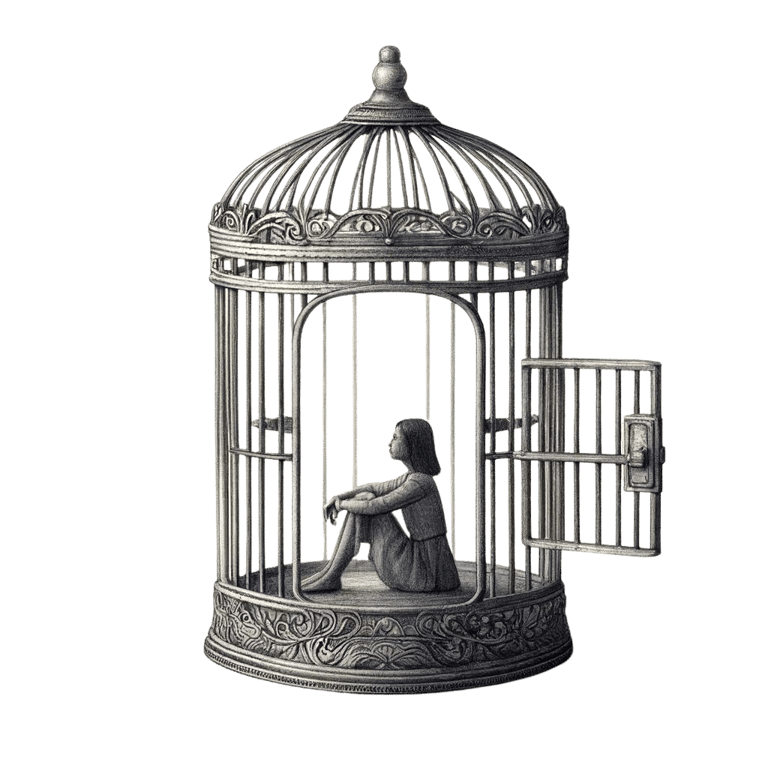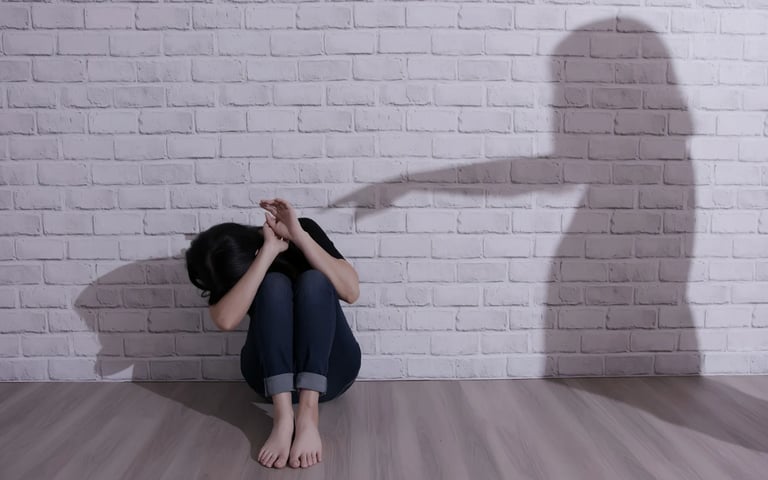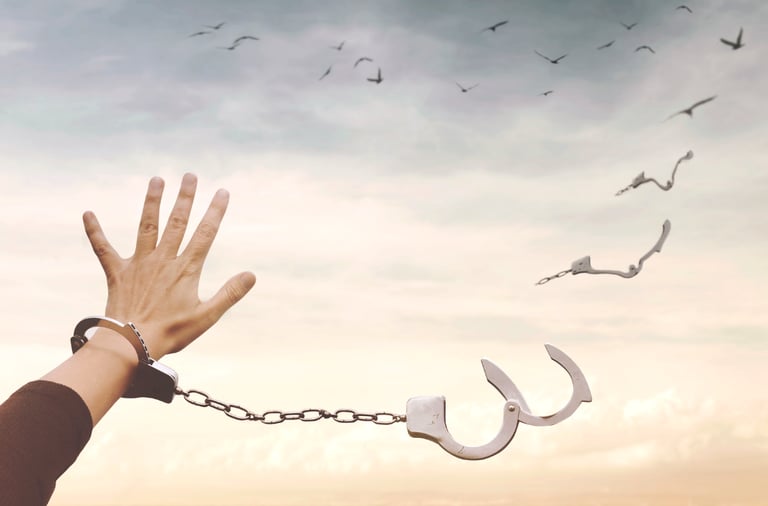Learned Helplessness and Victim Mentality
What is victim mentality? What causes it and what can we do about it? How is it different from learned helplessness? This post sheds light on the subtle distinctions between these often misunderstood concepts. Whether you're seeking ways to navigate your own journey or looking to support someone else on their path, I hope this guide will offer you some valuable insights.
A victim mindset or mentality is a way of thinking where a person perpetually sees themselves as the victim, blaming external factors for their challenges instead of taking proactive steps to address them. This behaviour can be described as "playing the victim" regardless of the reality of the situation.
Victim mentality functions as a defense mechanism. People with a victim mentality may use their perceived victimhood to protect themselves from feelings of guilt and shame and to avoid taking responsibility for their actions or circumstances. By attributing their challenges solely to external factors or to others, they can avoid facing uncomfortable emotions or acknowledging their role in certain situations. It provides a psychological defense against feelings of inadequacy and guilt.
Blaming Others Consistently, Limited Empathy
Individuals with a victim mindset tend to blame external factors, other people, or circumstances for their challenges. They may be quick to point fingers and rarely take responsibility for their actions or decisions. That can take a toll on their friendships and relationships, as they tend to prioritize their own victim narrative over the pain of other people.
Chronic Complaining
Complaining can serve as a way for individuals with a victim mindset to express their frustrations, seek sympathy and validation, or justify their current circumstances. It may also be a means of reinforcing their narrative of being unfairly treated by external forces.
Resistance to Constructive Feedback
Responding defensively or dismissively to constructive feedback and displaying anger towards people who suggest taking responsibility.
Unwillingness to Learn and Grow
Avoiding opportunities for personal growth and learning, as embracing change may conflict with the victim narrative.
Chronic Blame and Criticism
If someone has been shamed and criticized a lot during childhood, their mind might protect them from feelings of guilt and inadequacy by never accepting any blame again, thus creating a victim identity. Especially when these feelings were combined with punishment or rejection.
Fear of Responsibility
Teaching children to take responsibility for their actions is an important part of parenting. However, putting too much responsibility on their shoulders before they're ready for it can have the opposite result. A child feeling responsible for "adult" problems and inevitably failing to solve them might develop a crippling fear of taking responsibility for anything later in life.
Taking responsibility would mean that their actions have consequences and they can be judged for their choices. But by avoiding responsibility they can never learn and change their outcomes, creating a vicious cycle that keeps them stuck.
Limited Coping Skills and a Fragile Sense of Self
What happens when someone holds us accountable for something? A well-adjusted individual will analyze the situation and recognize their role in the negative outcome. They'll take responsibility, apologize and learn from their experience.
For a person with a victim mindset, accepting blame is terrifying. In their subconscious perception, if they are guilty of something, that means they're "bad" and they'll suffer a terrible punishment. Being a victim is associated with being "good" and it makes other people more likely to take their side.
Parental and Societal Influence
Parents who consistently exhibit a victim mentality, blaming external factors for their circumstances without taking personal responsibility, can model this mindset to their children, who may then adopt a similar outlook.
Being in social or peer groups that frequently engage in victim-based discourse can reinforce and normalize a victim mentality, making it a shared outlook rather than an individual's perspective. Educational or institutional environments that either do not address coping skills and emotional resilience or overemphasize victimhood without providing pathways to empowerment, can contribute to developing a victim mindset.
The societal tendency to view victims as inherently good and virtuous can contribute to a victim mentality. This bias offers emotional validation and sympathy, possibly encouraging individuals to adopt a victim identity for comfort or attention. It can also provide a moral high ground, making the victim role appealing as it allows for blaming external factors rather than facing personal responsibility. This dynamic is reinforced by media and societal narratives that glorify victimhood, potentially making it a defense mechanism to avoid criticism and self-reflection. While recognizing genuine victimization is crucial, it's important to balance this with promoting resilience and personal growth.
How to Break Free from a Victim Mentality:
Changing your mindset is not easy, but it's absolutely worth it. If you feel like you might suffer from victim mentality, here's what you could try:
Reflect on your childhood and give your child-self some love and understanding. Have you been criticized, blamed, or shamed? Have your parents put unrealistic expectations on you too early? Do you feel guilty about something that happened to you when you were little? Let me tell you - no child is responsible for what happens to them. Whatever it is you feel guilty about, it wasn't your fault. You were just an innocent child. If you're blaming yourself for anything - this is a good moment to practice self-forgiveness and absolve your childhood self from guilt.
How to Help Someone with a Victim Mentality:
Helping someone overcome their victim mindset can be challenging, but it's not impossible. Here are some strategies you can consider:
Express Empathy:
Begin by expressing empathy and understanding. Let them know you recognize their feelings and that you're there to support them. Listen attentively to their concerns and frustrations. Allow them to share their perspective without judgment. This helps them feel heard and valued.
Encourage Self-Reflection:
Gently encourage them to reflect on their role in certain situations. Ask open-ended questions that prompt them to consider alternative viewpoints. Avoid blaming or criticizing them directly. Instead, focus on the behaviours or patterns of thinking that contribute to their challenges.
Encourage Problem-Solving:
Shift the focus toward finding solutions rather than dwelling on problems. Help them brainstorm practical steps to address challenges proactively.
Lead by Example:
Demonstrate a proactive and responsible attitude in your own life. Lead by example, showing how taking responsibility can lead to personal growth and positive outcomes. Acknowledge and reinforce positive behaviors when they do take responsibility or exhibit growth.
Highlight Personal Agency:
Emphasize their personal agency and ability to make choices. Help them see that taking responsibility is a source of empowerment, not a burden.
Suggest Professional Help:
If their victim mentality significantly impacts their well-being and relationships, suggest seeking support from a mental health professional who can provide guidance and tools for change.
Offer Resources:
Recommend books, articles, or workshops on personal development, responsibility, and resilience. Sometimes external resources can provide a different perspective.
Set Boundaries:
Changing ingrained thought patterns takes time. Be patient and persistent in your support if you wish to do so, but don't compromise your own well-being. Establish clear boundaries in your interactions - if their blame becomes excessive or harmful, let them know you won't engage in these conversations.
Learned Helplessness
At its core, learned helplessness revolves around a sense of powerlessness — a belief that one's actions have little influence on the outcomes of their life. This perception, often formed in response to repeated adversity, can lead to a passive acceptance of challenging situations, as the individual comes to view change as beyond their control.
The concept of learned helplessness is sometimes illustrated through the metaphor of an elephant with a wooden stake in the ground. Imagine a scenario where an elephant, as a young calf, is tethered to a small wooden stake in the ground. The young elephant pulls and strains against the restraint, but the stake remains firmly anchored. Over time, the elephant learns that its efforts to break free are futile.
As the elephant grows into a massive, powerful creature, it continues to believe that the small stake has the strength to hold it in place. Despite its capacity to easily uproot the stake, the learned helplessness from earlier experiences keeps the elephant bound to the perceived limitations.
Similarly, learned helplessness in humans can occur when individuals repeatedly face challenging situations where their efforts seem ineffective. Over time, they may internalize a belief that they have little control over their circumstances, even when opportunities for change present themselves.


Signs of Learned Helplessness
Passivity
Individuals may exhibit a passive attitude, feeling resigned to their situation and believing that their efforts will not lead to change. They tend to avoid challenges and opportunities, they don't take action or initiative and prefer not to make any important decisions. They usually let other people take the lead.
Pervasive Hopelessness and Pessimism
A pervasive sense of hopelessness and a belief that negative outcomes are inevitable contribute to their negative outlook on life. They often engage in negative thought patterns, such as catastrophic thinking or expecting the worst, reinforcing a sense of helplessness.
Low Self-Esteem
Low self-esteem and a diminished sense of self-worth are often the result of repeated experiences of perceived failure and lack of control over their circumstances.
Acceptance of Negative Situations:
Acceptance of negative or undesirable situations without attempting to improve or change them. For example, choosing to stay in an unhappy relationship or in a soul-crushing job
Possible Causes of Learned Helplessness


Repeated Failures
Individuals who experience repeated failures or negative outcomes despite their efforts may develop a belief that their actions do not have any impact on their situation. This is often observed in educational or workplace settings where constant effort does not lead to success.
Uncontrollable Situations
Being in situations where one has no control or where outcomes seem random can lead to learned helplessness. This could be in abusive relationships, highly restrictive environments, or dealing with systemic issues where individuals feel powerless.
Observational Learning
Witnessing others, especially significant figures like parents or peers exhibit helpless behaviour can lead to learned helplessness. If a person sees others not attempting to change their situation or believing they have no control, they might adopt a similar mindset.
Trauma and Chronic Stress
Experiencing traumatic events or chronic stress can lead to feelings of helplessness, especially if the individual feels they cannot escape their situation. Trauma experienced in childhood has a long-lasting impact - a child is always powerless and when they fall victim to bad circumstances over and over again, they might assume it will always be this way and that they won't ever be able to break free.
How to Break Free from Learned Helplessness


Reflect on Your Situation
Getting rid of the feeling of helplessness begins by taking a good look at the situation you're in. The goal is portrayed by The Serenity Prayer:
'God, grant me the serenity to accept the things I cannot change,
the courage to change the things I can,
and the wisdom to know the difference.'
Take some time to reflect on whether there are things in your life you could change and what resources you'd need to do it.
You might feel like it's all futile right now and I understand how difficult it is. This feeling of helplessness is likely to have its roots in your childhood. Like the elephant tied to a wooden stake - you might have acquired the belief that no matter what you do or how hard you try, nothing is going to change, so why even try?
But it's important to recognize that you're no longer the person you were when you first experienced helplessness. Look at the differences - what can you do now that you couldn't before? What resources do you have access to, and who could you ask for help? When you were a child you couldn't change anything about your situation, but now you can muster the courage to take control over your life and change it for the better.
Manage Your Goals
You should set small, achievable goals. Celebrate your achievements, no matter how minor they might seem. Even small successes can build confidence and a sense of control, countering feelings of helplessness.
Practice Optimism
Practice optimism consciously. This doesn’t mean ignoring reality but rather focusing on what can be controlled and finding positive steps to take, even in difficult situations.
Develop Skills
Feelings of helplessness can stem from a perceived lack of ability. Even if you lack certain skills that would give you more options, it's never too late to learn.
Seek support
Sharing experiences and feelings with friends, family, or professionals can provide new perspectives and strategies for overcoming challenges. In cases where learned helplessness is deep-rooted and significantly impacts your life it can be beneficial to seek therapy from a licensed professional. They can offer personalized strategies and support for overcoming your struggles.
How to Help Someone with Learned Helplessness
If someone you care about expresses signs of learned helplessness and you really want to help, you'll need a lot of patience and understanding to avoid making matters worse. It can be frustrating to see someone stay in a terrible situation. While you can see the way out clearly, you need to understand that they simply can't.
Remember, your role is to support, not to cure. It's about empowering them to take steps towards change, not forcing change upon them. It's your understanding, patience, and guidance that has the potential to make a significant difference in their journey.
Don't Invalidate Feelings:
Acknowledge and validate their emotions. Ask open-ended questions to understand their perspective better without judgment or dismissal.


NEVER Engage in Victim Blaming:
It's crucial to approach the conversation with empathy and understanding. Focus on empowerment and encouragement rather than assigning fault for their situation. Don't say things like "you're doing this to yourself", even if you feel like that's the case. It can damage your relationship and trigger an emotional episode. Many people with learned helplessness have gone through terrible trauma in the past, be gentle if you wish to help.
Encourage Small Achievements:
Help them set achievable, small goals to build confidence. Celebrate these successes to help shift their perspective from helplessness to capability.
Foster Autonomy:
Encourage decision-making on even minor choices to help them feel a sense of control over their life. This empowerment can gradually rebuild their belief in their ability to influence their circumstances.
Encourage Professional Help:
Sometimes, the best way to help is to encourage seeking assistance from a mental health professional. They can provide therapy and interventions specifically tailored to overcoming learned helplessness.
Overcoming learned helplessness requires patience, courage, and a strong belief in your ability to change. It’s a journey filled with obstacles, self-doubt, and reminders of past difficulties. However, it’s crucial to understand that overcoming this challenge is possible. You have inner strength, maybe not yet realized or remembered, ready to support you in your journey.
Taking the first step means starting to believe you can alter your story. It won’t be simple, and there might be times when the goal seems too far away. Yet, every small step forward counts as a win. It reflects your resilience and a change in perspective, acknowledging that you have control over your own path.
The journey ahead is yours to define. With every step, you’ll discover more about yourself, including strengths you didn’t know you had, and you’ll learn valuable lessons. This journey isn’t just about moving away from feelings of helplessness; it’s about finding your strength and making significant improvements in your life.
Remember, as you start this journey, you’re not alone. You’ll get support, whether from guides, peers, or your own inner strengths, ready to help you through. Trust in yourself and your ability to change.
From genetics to culture, various factors shape our mindset from a very young age. Yet, perhaps nothing leaves a lasting impact quite like our upbringing and early life experiences.
If you're someone who loves helping others, you might have come across individuals who seem resistant to change. Or maybe you've heard about victim mentality and you'd like to learn more.
Whatever brought you here, my goal is to help you find insights that will aid you on your journey.
Provide Resources and Information:
Share books, articles, or online resources about overcoming adversity and building resilience. Knowledge can be empowering and may help them feel less isolated in their experiences.
Be Patient and Consistent:
Change won't happen overnight. Show that you're there for the long haul, offering consistent support and understanding as they work through their feelings of helplessness.


Show Positive Behavior and Thought Patterns:
Sometimes, leading by example can be incredibly influential. Demonstrate positive coping strategies and a resilient mindset in your own life.
Writer's Note
Reflect on your personality and think about your strengths and weaknesses. What do you like about yourself and what could you improve upon? Accept that in order to be whole, you need to have both good and bad traits. Every good quality has a bad counterpart (e.g. being optimistic can result in being naive; being assertive can sometimes come off as being overly dominant) and we need to accept all sides of ourselves, the good and bad.
Reflect on what it means to be guilty or wrong. Is there a part of you that believes being guilty or wrong means that you're a bad person? Or that you're not good enough? It's an illusion of your subconscious mind. It's okay to make mistakes, it's okay to fail. We're human, we live and we learn. Sometimes we end up making bad decisions, but that's just what it is. Taking responsibility is scary, but it's also very empowering. While you may not control every circumstance, you have agency in how you respond and the decisions you make.
Learn from adversity, and view challenges as opportunities for growth. Extract lessons from difficult situations and use them to build resilience. Instead of dwelling on problems, focus on finding solutions. Break challenges into smaller components and address them one by one.
Seek guidance if you find yourself walking in circles. Talking to a skilled therapist or a mentor can make all the difference.
Thank you for reading my article, I hope you found it insightful. If you have any questions, connect with me on Threads, Instagram, or Facebook.
Are you interested in personalized advice?


Victim Mindset/Victim Mentality
Signs of a Victim Mentality:


Possible Causes of a Victim Mentality:



